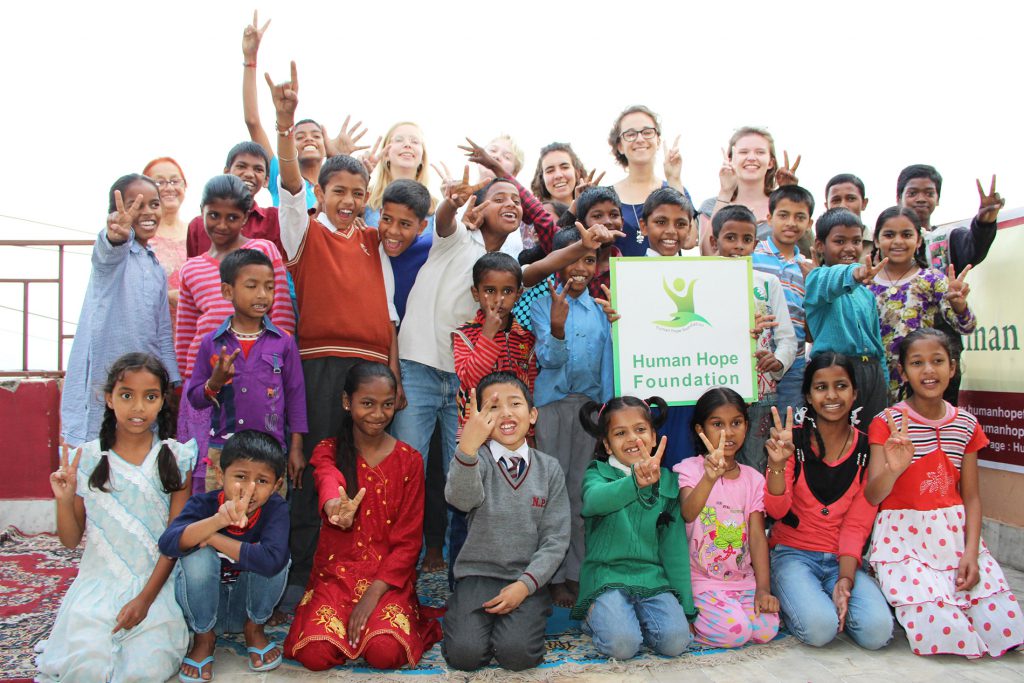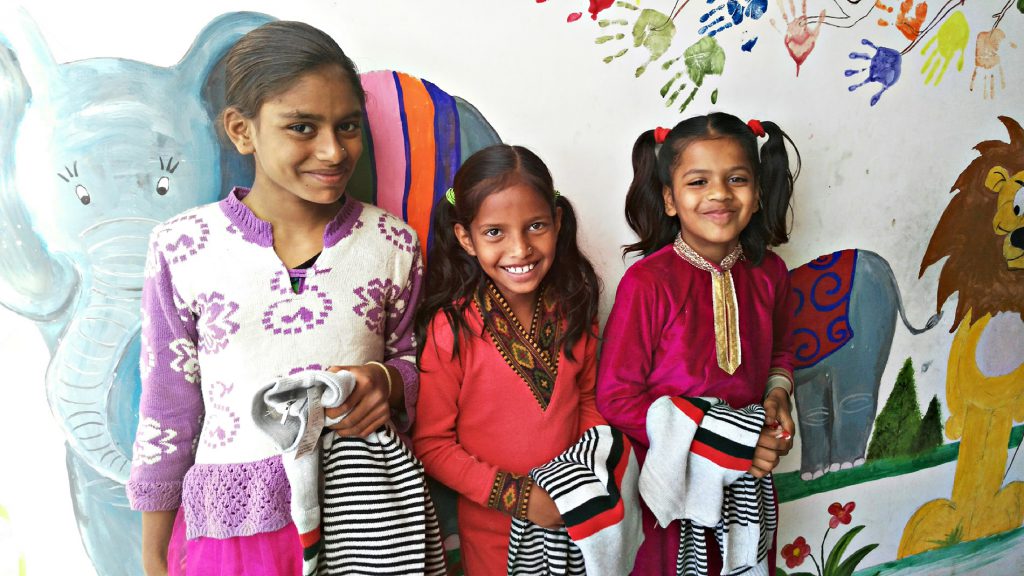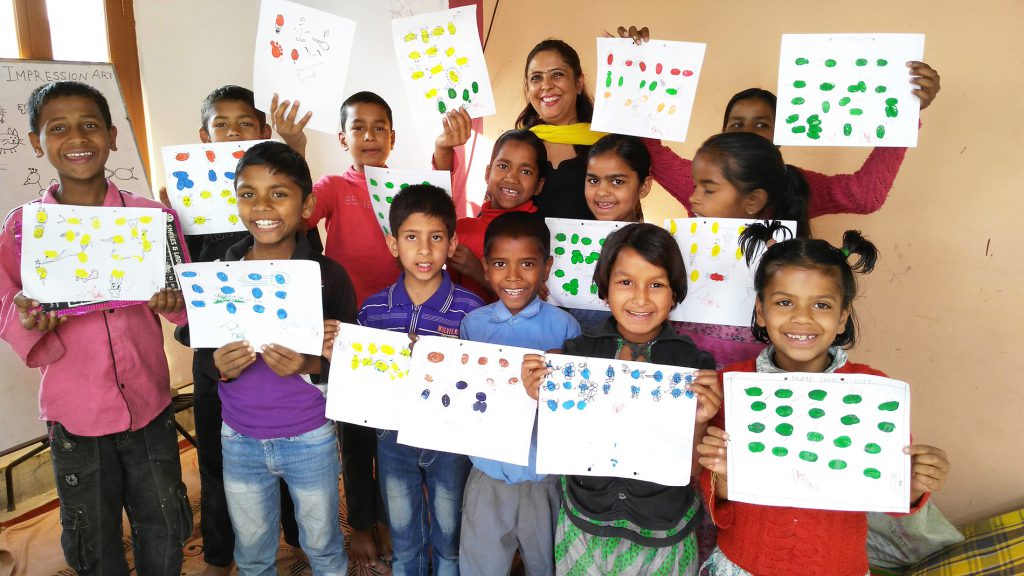Human hope foundation: giving children in Shimla a fair change
The Human Hope Foundation in Shimla, India, is reshaping the lives of children and empowering them with the tools for a brighter future.
By Rute Costa
The first time I set foot in the home of Human Hope Foundation in Shimla, I climbed the stairs to the top to find a large, open terrace overlooking the face of the mountains. At the foothills of the Himalayas, clouds greeted me at eye-level, and masked the mountain tops. The view was idyllic, to say the least, and the children met me with a kind of unbounded joy I had never witnessed before. In the weeks that followed, I was reminded, over and over again, that their harsh realities played on against this breathtaking background.
In September 2016, I met the founder, Vikram, the children and the local volunteers of this NGO which provides underprivileged children with after-school remedial education and activities. I had been travelling and volunteering across Northern India for weeks, teaching drama workshops to children and young people, and although I felt very welcome everywhere I went, nothing quite matched the hospitality and the warmth I received at Human Hope Foundation. Now, a year and three months later, I meet Vikram over Skype to chat about what the organisation has been up to.
Knowing the founder is a shortcut to understanding the mission and the values of the Foundation. Vikram had been working in corporate finance for sixteen years when he decided it was time for a change. “Even when I was working, doing well, there was always something at the back of my mind telling me I was missing something – my heart was not there”, he confesses. Instead, his “heart” was set on helping the disadvantaged children he saw “roaming aimlessly” on the streets of Shimla his entire life – a scene, he says, “that always disturbed me”. Vikram reveals the particular thought that turned his life around, about two and a half years ago: “I thought: ‘I’m reaching forty, I want to make a change: if not now, then when?’”
“Everywhere, there are unknown faces, unknown people who are doing a lot of social work, either in hospitals, streets, or old age homes.”
When I ask Vikram about his inspiration, he doesn’t cite public figures, or well-known activists. Instead, he tells me his inspiration “has always been the local people doing charitable work”: “Everywhere, there are unknown faces, unknown people who are doing a lot of social work, either in hospitals, streets, or old age homes”. His mother, Mrs Uma Kanwar (who, by the way, makes a delicious fruit cake), was one of these people who devoted their time to helping the community. So, curious, I ask Vikram whether she was supportive of such a dramatic change in her son’s life from the offset. He explains that, “like every mother would, she was skeptical of me leaving a safe, full-time job to do something different”, but that, later, “she accepted”. They both welcomed the foundation into their home with arms wide open.

Human Hope Foundation’s main focus is education. Vikram explains that government schools, especially in rural or suburban areas in India, don’t have the necessary resources to ensure their students are, in fact, learning. Often, children lack the foundations of knowledge and skills that allow them to progress academically. He clarifies that the government has done excellent work in improving students’ access to schools, but that “there is a lack of accountability and a general apathy towards learning outcomes” and that these “have been very poor”. The foundation’s mission is to ensure that their students don’t become negatively affected by the system. They offer remedial classes, with a particular focus on Maths and English, to close the learning gaps that schools do not address. “It’s a matter of fact that every parent wants their child to study, to be educated”, Vikram says. That explains the large number of kids who now make up the Foundation.
Every day after school, six days a week, the children run up the stairs of Vikram’s home to learn more. But the classes led by volunteer teachers are only responsible for part of the beneficial impact the Foundation has on them. Vikram emphasises how important it is that the kids have fun before they focus in class: “whenever students come, we let them play for forty-five minutes to one hour”. The foundation collaborates with volunteers to teach a bit of everything, from arts and crafts, to drama and dance. And the children love it. I ask Vikram why these extracurriculars are important, besides providing the students with a good time and encouraging them to return every day: “they help build confidence, encourage their creativity and most importantly, the children start believing in themselves”.
“We have two girls” Vikram tells me, “good friends, neighbours, who have been with us since day one. Initially, they would never raise their hands, even if they knew the answer, because of lack of confidence”. I think I know who he is talking about, but I get the confirmation I was looking for when he reveals the girls’ names. I remember teaching Shanti and Nishu, and being amazed at their progress. They went from sitting quietly in the corner to effusively volunteering to lead group activities, in just a couple of weeks: all they needed was a bit of time and encouragement. Returning volunteers notice this progress, and their feedback, Vikram says, “means much more than school reports”.
“Children are always open – they all have an open mind.”
The Foundation’s plan of action extends beyond its students: it tries to offer their families support too. Vikram sees the need in understanding where these children come from, as it influences their learning needs and behaviour. That is why, when I was there, he took me and some fellow volunteers to visit the mother of two students. She welcomed us kindly into her home – a single, packed room for five people, with two beds, a hob, and no running water – and made us the most delicious masala chai I’ve ever tasted. Families like this one have very little income, most of it coming from the father. Mothers are often stuck with precarious, irregular jobs, or nothing at all. Parents are more likely to withdraw their kids from school, and take them into work, if they are struggling to make ends meet. Vikram started the Livelihood Program because of this. The Foundation invests in materials and teaches mothers to craft reusable carrier bags and candles. The profit from the sales goes to them, and helps their families.

Although support has been inflowing from volunteers and material donations – mainly stationery – it is still falling short. When I ask Vikram about the biggest challenges Human Hope Foundation faces, he boils it down to two things: specialised teachers and lack of space. At the moment, they can’t afford the training that prepares volunteer teachers to help students with their particular learning needs; and they can’t afford a bigger space. They are constrained within the boundaries of the top floor of Vikram’s house – the open terrace and the adjacent room – and there is only so much 47 children can do in there. “Every second day I have to say ‘no’ [to new parents and students], because there’s no space, and we have to make sure the children get proper attention”, Vikram tells me, with regret.
“The Foundation’s plan of action extends beyond its students: it tries to offer their families support too.”
However, hope is not merely in the name: Vikram has plans to grow and tackle these challenges. He has found the potential new Human Hope Foundation headquarters, and negotiated a good value, but needs financial aid to secure it. He speaks with excitement about the prospect of expansion, not only in physical space, but in the numbers of people they can reach out to and help. Four or five rooms could mean more children are taken off the streets and guided through their education and development. An increase in financial support would also help the foundation train more teachers and extend their Livelihood Program to more women in the community.

With a hint of tingling nostalgia, I say goodbye to Vikram with a promise to be sent regular updates on the children, through videos and photos. He is off to record a song and dance that they have been preparing for a few days. If, like me, you want to keep updated, follow their progress, and find out how you can help, visit their project page.
Photo credit: Vikram Kanwar/Human Hope Foundation
See Project
